Game Mechanics: Sometimes You Want to Push Your Luck
In our last article, we talked about how to create tension in your game using specific mechanics or a combination of those mechanics. This week, we’ll look at how to implement the right game mechanics to create a great push your luck experience in your game.
The first thing to keep in mind is that when I say, “push your luck”, I’m talking about something different than pure luck.
Pure luck is when you have to roll exactly two 6’s on your dice to get the 12 you need to accomplish a goal.
Push your luck is when you have to decide whether to keep going to gain more of whatever you’re collecting (money, diamonds, progress, etc.) and risk losing it all or stopping and collecting what you’ve already gained.
We’ll go through a bunch of different examples of games that do this well to further illustrate the point.
So, let’s jump right in!
Push Your Luck Board Game Mechanics Involving Dice-Chucking
One of the best examples of push your luck using dice is the Sid Saxon classic Can’t Stop. It’s a game with simple game mechanics that anyone can learn play… and it feels a bit like gambling.
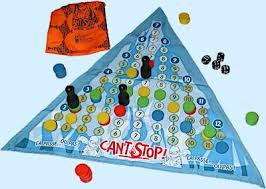
You roll four dice and arrange them to make different combinations of two dice each. Sum these up and choose your two pairs of dice to get your starting numbers. Then you move temporary markers up the track for those numbers. The goal is to get to the top of the track for that number to score a point. The first player to 3 points wins.
But you only have three of these markers available. Once placed, you must roll at least one combo that adds up to one of these numbers. If you succeed, you advance the marker. If you fail, you lose your temporary progress for this round, and it moves on to the next player.
Another dice-chucking game that implements the push your luck game mechanic well is Zombie Dice.
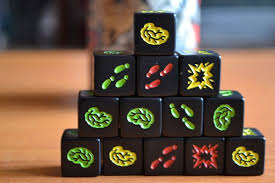
It utilizes the “3 strikes and you’re out” rule, which is best known from baseball.
You roll 3 dice. The results of each are either brains (good), run (neutral), or shotgun blast (bad). You collect the brains, get to re-roll run dice, and count shotgun blasts as “strikes.” You can continue to roll 3 dice as many times as you want and “bank” your brains at any time, but if you end up with 3 or more shotgun blasts, you lose your brains you’ve earned this round.
The first player to 13 brains wins.
Hey, No Dice!
Many push your luck games (including casino games) involve dice, but that’s not the only way to implement this game mechanic well.
One game that also does this really well is Quacks of Quedlinburg. It’s a bag-building game where you continuously add more ingredients to your bag, which you draw from to make your potion. But there is a threshold to how many white chips you can draw before your potion explodes.
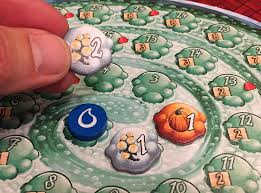
However, when your potion explodes, all is not lost. You do lose out on some of the benefits, but not all of the possible rewards.
You could even say that Pandemic has some elements of push your luck. You know that you’ll hit an epidemic card at some point and can risk not taking care of some diseases in hopes that you’ll accomplish other tasks and find a cure sooner. But there is a risk involved with every decision.
Pandemic does this in an interesting way, shuffling the events into different sections of the deck so that there is no way to get 4 of them in a row.
It is such a simple and elegant game mechanic, that I have used this in not one, but two of my own games.
The first of these was King of Indecision, which is all about pushing your luck, but it has no dice at all.
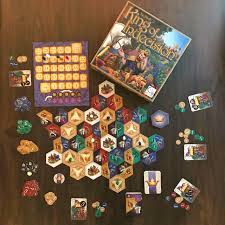
You play as nobles collecting goods that the King desires, trying to anticipate when he will change his mind. Similar to Pandemic, King of Indecision incorporates a new goal card that will appear in each section of 4 cards within the deck, so you know that a change is coming soon, you just don’t know when!
Your goal is to have the most of the current goods on offer to the King before he changes his mind. It involves a lot of good decision-making and jockeying for position with other players.
Kingdom’s Candy: Monsters, which is a game I co-designed, uses a similar deck set up to indicate when you must feed the monsters you have saved. You have to be careful to have enough sugar cubes on hand to feed them and not take too many monsters on at once!
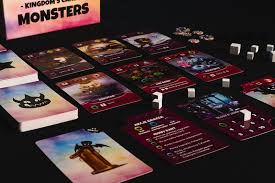
No discussion of push your luck is complete, however, without mentioning Incan Gold (also published under the name Diamante).
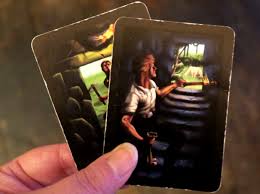
It is such a simple concept. You’re adventurers exploring temples. Every step of the way you either encounter treasures or an obstacle. If a second obstacle of the same type is drawn from the deck, all adventurers still in the temple run away, but they lose all the gems they have found in this temple.
Every turn you only have one decision. To quote The Clash, “Should I stay or should I go now?”
One thing you’ll notice is that most push your luck games rely on the simple choice they give players – stop or keep going. If you get too greedy you could end up with nothing, but if you don’t take any risks, another player will likely beat you. It’s simple to understand, but it makes for some tough decisions!
Whether through using dice, cards, bag-building, or another game mechanic, you can see there are lots of interesting ways to create a great push your luck experience in your game.
What other games have you played that implement push your luck really well? How did they build this into the game?
Please leave a comment and share your experience.
Next week we’ll be looking at how to mitigate luck in your game.
Whether you incorporate push your luck or other mechanics into your game, it’s important to ensure you have a vision for your game that you can stick to throughout the development. Get my FREE 10 Minute Board Game Design Blueprint, which will help you with this every step of the way.

9 comments
Bill Murphy
I love push your luck games. Working on a cartoony fantasy battle game, where you spend action points (initiative). The more you do the cheaper action cost. But do you stop for cheaper actions next round letting your opponents go or pay big and go now. Pushing your luck,
Also in combat your if you’re outnumbered by more than double your combat power you can go for an heroic Moment / Epic Fail. You spend Initiative (action points) to increase your Combat Power. The catch is if you lose the combat round all negatives for doing so are doubled. Win or lose you spent Initiative to do so. More push your luck.
Love King of Indecision from the first time I played. Even the play-test.
Joe Slack
They really do provide a lot of tension and difficult choices!
I’m glad you enjoy King of Indecision so much, Bill!
Mitchell Allen
RISK comes to mind. You’ve massed your troops in one country and now it’s time to sweep through the neighboring lands. Do you push until you only have a small force left, or do you wait, leaving a strong defensive front?
Cheers,
Mitch
Joe Slack
Another great example, Mitch! Risk has a lot or push your luck for sure. You have to take some calculated risks and rely on some lucky rolls once in a while. 🙂
Andrew Weeks
Favorite example as a kid would be “Pass the Pigs”
Joe Slack
I haven’t played that one before. Thanks for the addition, Andrew!
Bill Murphy
I’m a huge fan of these articles. I have to mention Games Workshop’s Blood Bowl, the fantasy football game. No drafting NBA league players here!
In this fantasy football game, you play with goblins, elves, dwarves, humans, trolls, halflings, and many more fantasy world tropes. They all make up various teams of Super Bowl-style North American football mixed with rugby.
On your turn, you can move, block, dodge opponents, pick up the ball, and throw. One player per turn can blitz, and that’s a move and a black. Most of the time, you can only do one of these things with each of your players (figures). You start the kickoff with 11 on the field.
Now here’s the push your luck part of it. You most of the time do actions with players that have no chance of failing. Next would be some chance of failing but good odds of success. Then the tricky ones. This is important because if any of your players (figures) fail to complete their task, your turn ends, and the rest of your team has to wait until next turn. Sometimes you need to have teammates move or dodge or block to set up for the big play that turns. How much do you push your luck to see if you can get every player organized the way you want and risk not doing the big play at all? Blood Bowl is a punishing game. It does make the successes so rewarding, and the excitement it creates is outstanding.
Bill Murphy
Correxctiion. NBA shoud be NFL. LOL.
That might be a game NBA with fantasy theme. Hummm.
Joe Slack
I’ll have to play Blood Bowl with you sometime, Bill!